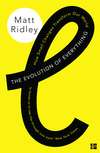Читать книгу: «The Evolution of Everything: How Small Changes Transform Our World», страница 2
Newton’s nudge
In his passionate attachment to rationalism, materialism, naturalism, humanism and liberty, Lucretius deserves a special place in the history of Western thought, even above the beauty of his poetry. The Renaissance, the scientific revolution, the Enlightenment and the American Revolution were all inspired by people who had to some degree imbibed Lucretius. Botticelli’s Venus effectively depicts the opening scene of Lucretius’s poem. Giordano Bruno went to the stake, with his mouth pinned shut to silence his heresies, for quoting Lucretius on the recombination of atoms and the awe with which we should embrace the idea that human beings are not the purpose of the universe. Galileo’s Lucretian atomism, as well as his Copernican heliocentrism, was used against him at his trial. Indeed, the historian of science Catherine Wilson has argued that the whole of seventeenth-century empiricism, started by Pierre Gassendi in opposition to Descartes, and taken up by the most influential thinkers of the age, including Thomas Hobbes, Robert Boyle, John Locke, Gottfried Leibniz and Bishop Berkeley, was fuelled to a remarkable extent by the sudden popularity of Lucretius.
As Lucretian ideas percolated, the physicists were the first to see where they led. Isaac Newton became acquainted with Epicurean atomism as a student at Cambridge, when he read a book by Walter Charleton expounding Gassendi’s interpretation of Lucretius. Later he acquired a Latin edition of De Rerum Natura itself, which survives from his library and shows signs of heavy use. He echoed Lucretian ideas about voids between atoms throughout his books, especially the Opticks.
Newton was by no means the first modern thinker to banish a skyhook, but he was one of the best. He explained the orbits of the planets and the falling of apples by gravity, not God. In doing so, he did away with the need for perpetual divine interference and supervision by an overworked creator. Gravity kept the earth orbiting the sun without having to be told. Jehovah might have kicked the ball, but it rolled down the hill of its own accord.
Yet Newton’s disenthralment was distinctly limited. He was furious with anybody who read into this that God might not be in ultimate charge, let alone not exist. He asserted firmly that: ‘This most elegant system of the sun, planets, and comets could not have arisen without the design and dominion of an intelligent and powerful being.’ His reasoning was that, according to his calculations, the solar system would eventually spin off into chaos. Since it apparently did not, God must be intervening periodically to nudge the planets back into their orbits. Jehovah has a job after all, just a part-time one.
The swerve
That’s that then. A skyhook still exists, just out of sight. Again and again this was the pattern of the Enlightenment: gain a yard of ground from God, but then insist he still holds the field beyond and always will. It did not matter how many skyhooks were found to be illusory, the next one was always going to prove real. Indeed, so common is the habit of suddenly seeing design, after all the hard work has been done to show that emergence is more plausible, that I shall borrow a name for it – the swerve. Lucretius himself was the first to swerve. In a world composed of atoms whose motions were predictable, Lucretius (channelling Democritus and Epicurus) could not explain the apparent human capacity for free will. In order to do so, he suggested, arbitrarily, that atoms must occasionally swerve unpredictably, because the gods make them do so. This failure of nerve on the part of the poet has been known since as the Lucretian swerve, but I intend to use the same phrase more generally for each occasion on which I catch a philosopher swerving to explain something he struggles to understand, and positing an arbitrary skyhook. Watch out, in the pages that follow, for many Lucretian swerves.
Newton’s rival, Gottfried Leibniz, in his 1710 treatise on theodicy, attempted a sort of mathematical proof that God existed. Evil stalked the world, he concluded, the better to bring out the best in people. God was always calculating carefully how to minimise evil, if necessary by allowing disasters to occur that killed more bad people than good. Voltaire mocked Leibniz’s ‘optimism’, a word that then meant almost the opposite of what it means today: that the world was perfect and unimprovable (‘optimal’), because God had made it. After 60,000 people died in the Lisbon earthquake of 1755, on the morning of All Saints’ Day when the churches were full, theologians followed Leibniz in explaining helpfully that Lisbon had earned its punishment by sinning. This was too much for Voltaire, who asked sardonically in a poem: ‘Was then more vice in fallen Lisbon found/Than Paris, where voluptuous joys abound?’
Newton’s French follower Pierre-Louis Maupertuis went to Swedish Lapland to prove that the earth was flattened towards the poles, as Newtonian mechanics predicted. He then moved on from Newton by rejecting other arguments for the existence of God founded on the wonders of nature, or the regularity of the solar system. But having gone thus far, he suddenly stopped (his Lucretian swerve), concluding that his own ‘least action’ principle to explain motion displayed such wisdom on the part of nature that it must be the product of a wise creator. Or, to paraphrase Maupertuis, if God’s as clever as me, he must exist. A blazing non sequitur.
Voltaire, perhaps irritated by the fact that his mathematically gifted mistress Emilie, Marquise du Châtelet had slept with Maupertuis and had written in defence of Leibniz, then based his character Dr Pangloss in his novel Candide on an amalgam of Leibniz and Maupertuis. Pangloss remains blissfully persuaded – and convinces the naïve Candide – that this is the best of all possible worlds, even as they both experience syphilis, shipwreck, earthquake, fire, slavery and being hanged. Voltaire’s contempt for theodicy derived directly and explicitly from Lucretius, whose arguments he borrowed throughout life, styling himself at one point the ‘latter-day Lucretius’.
Pasta or worms?
Voltaire was by no means the first poet or prose stylist to draw upon Lucretius, nor would he be the last. Thomas More tried to reconcile Lucretian pleasure with faith in Utopia. Montaigne quoted Lucretius frequently, and echoed him in saying ‘the world is but a perennial movement … all things in it are in constant motion’; he recommended that we ‘fall back into Epicurus’ infinity of atoms’. Britain’s Elizabethan and Jacobean poets, including Edmund Spenser, William Shakespeare, John Donne and Francis Bacon, all play with themes of explicit materialism and atomism that came either directly or indirectly from Lucretius. Ben Jonson heavily annotated his Dutch edition of Lucretius. Machiavelli copied out De Rerum Natura in his youth. Molière, Dryden and John Evelyn translated it; John Milton and Alexander Pope emulated, echoed and attempted to rebut it.
Thomas Jefferson, who collected five Latin versions of De Rerum Natura along with translations into three languages, declared himself an Epicurean, and perhaps deliberately echoed Lucretius in his phrase ‘the pursuit of happiness’. The poet and physician Erasmus Darwin, who helped inspire not just his evolutionary grandson but many of the Romantic poets too, wrote his epic, erotic, evolutionary, philosophical poems in conscious imitation of Lucretius. His last poem, The Temple of Nature, was intended as his version of De Rerum Natura.
The influence of this great Roman materialist culminates rather neatly in the moment when Mary Shelley had the idea for Frankenstein. She had her epiphany after listening to her husband Percy discuss with George, Lord Byron, the coming alive of ‘vermicelli’ that had been left to ferment, in experiments of ‘Dr Darwin’. Given that Shelley, Byron and Erasmus Darwin were all enthusiastic Lucretians, perhaps she misheard and, rather than debating the resurrection of pasta, they were actually quoting the passage in De Rerum Natura (and Darwin’s experimental imitation of it) where Lucretius discusses spontaneous generation of little worms in rotting vegetable matter – ‘vermiculos’. Here is the history of Western thought in a single incident: a Classical writer, rediscovered in the Renaissance, who inspired the Enlightenment and influenced the Romantic movement, then sparks the most famous Gothic novel, whose villain becomes a recurring star of modern cinema.
Lucretius haunted philosophers of the Enlightenment, daring free thinkers further down the path that leads away from creationist thinking. Pierre Bayle, in his Thoughts on the Comet of 1680, closely followed Lucretius’s Book 5 in suggesting that the power of religion derived from fear. Montesquieu channelled Lucretius in the very first sentence of The Spirit of the Laws (1748): ‘Laws in their most general signification, are the necessary relations arising from the nature of things’ (my emphasis). Denis Diderot in his Philosophical Thoughts echoed Lucretius to the effect that nature was devoid of purpose, the motto for his book being a line from De Rerum Natura: ‘Now we see out of the dark what is in the light’. Later, in The Letter on the Blind and the Deaf, Diderot suggested that God himself was a mere product of the senses, and went to jail for the heresy. The atheist philosopher Paul-Henri, baron d’Holbach, took Lucretian ideas to their ultimate extreme in his Le Système de la Nature of 1770. D’Holbach saw nothing but cause and effect, and matter in motion: ‘no necessity to have recourse to supernatural powers to account for the formation of things’.
One place where such scepticism began to take hold was in geology. James Hutton, a farmer from southern Scotland, in 1785 laid out a theory that the rocks beneath our feet were made by processes of erosion and uplift that are still at work today, and that no great Noachian flood was needed to explain seashells on mountaintops: ‘Hence we are led to conclude, that the greater part of our land, if not the whole, had been produced by operations natural to this globe.’ He glimpsed the vast depths of geological time, saying famously, ‘We find no vestige of a beginning – no prospect of an end.’ For this he was vilified as a blasphemer and an atheist. The leading Irish scientist Richard Kirwan even went as far as to hint that ideas like Hutton’s contributed to dangerous events like the French Revolution, remarking on how they had ‘proved too favourable to the structure of various systems of atheism or infidelity, as these have been in their turn to turbulence and immorality’.
No need of that hypothesis
The physicists, who had set the pace in tearing down skyhooks, continued to surprise the world. It fell to Pierre-Simon Laplace (using Emilie du Châtelet’s improvements to cumbersome Newtonian geometry) to take Newtonism to its logical conclusion. Laplace argued that the present state of the universe was ‘the effect of its past and the cause of its future’. If an intellect were powerful enough to calculate every effect of every cause, then ‘nothing would be uncertain and the future just like the past would be present before its eyes’. By mathematically showing that there was no need in the astronomical world even for Newton’s Nudge God to intervene to keep the solar system stable, Laplace took away that skyhook. ‘I had no need of that hypothesis,’ he told Napoleon.
The certainty of Laplace’s determinism eventually crumbled in the twentieth century under assault from two directions – quantum mechanics and chaos theory. At the subatomic level, the world turned out to be very far from Newtonian, with uncertainty built into the very fabric of matter. Even at the astronomical scale, Henri Poincaré discovered that some arrangements of heavenly bodies resulted in perpetual instability. And as the meteorologist Edward Lorenz realised, exquisite sensitivity to initial conditions meant that weather systems were inherently unpredictable, asking, famously, in the title of a lecture in 1972: ‘Does the flap of a butterfly’s wings in Brazil set off a tornado in Texas?’
But here’s the thing. These assaults on determinism came from below, not above; from within, not without. If anything they made the world a still more Lucretian place. The impossibility of forecasting the position of an electron, or the weather a year ahead, made the world proof against the confidence of prognosticators and experts and planners.
The puddle that fits its pothole
Briefly in the late twentieth century, some astronomers bought into a new skyhook called the ‘anthropic principle’. In various forms, this argued that the conditions of the universe, and the particular values of certain parameters, seemed ideally suited to the emergence of life. In other words, if things had been just a little bit different, then stable suns, watery worlds and polymerised carbon would not be possible, so life could never get started. This stroke of cosmic luck implied that we lived in some kind of privileged universe uncannily suitable for us, and this was somehow spooky and cool.
Certainly, there do seem to be some remarkably fortuitous features of our own universe without which life would be impossible. If the cosmological constant were any larger, the pressure of antigravity would be greater and the universe would have blown itself to smithereens long before galaxies, stars and planets could have evolved. Electrical and nuclear forces are just the right strength for carbon to be one of the most common elements, and carbon is vital to life because of its capacity to form multiple bonds. Molecular bonds are just the right strength to be stable but breakable at the sort of temperatures found at the typical distance of a planet from a star: any weaker and the universe would be too hot for chemistry, any stronger and it would be too cold.
True, but to anybody outside a small clique of cosmologists who had spent too long with their telescopes, the idea of the anthropic principle was either banal or barmy, depending on how seriously you take it. It so obviously confuses cause and effect. Life adapted to the laws of physics, not vice versa. In a world where water is liquid, carbon can polymerise and solar systems last for billions of years, then life emerged as a carbon-based system with water-soluble proteins in fluid-filled cells. In a different world, a different kind of life might emerge, if it could. As David Waltham puts it in his book Lucky Planet, ‘It is all but inevitable that we occupy a favoured location, one of the rare neighbourhoods where by-laws allow the emergence of intelligent life.’ No anthropic principle needed.
Waltham himself goes on to make the argument that the earth may be rare or even unique because of the string of ridiculous coincidences required to produce a planet with a stable temperature with liquid water on it for four billion years. The moon was a particular stroke of luck, having been formed by an interplanetary collision and having then withdrawn slowly into space as a result of the earth’s tides (it is now ten times as far away as when it first formed). Had the moon been a tiny bit bigger or smaller, and the earth’s day a tiny bit longer or shorter after the collision, then we would have had an unstable axis and a tendency to periodic life-destroying climate catastrophes that would have precluded the emergence of intelligent life. God might claim credit for this lunar coincidence, but Gaia – James Lovelock’s theory that life itself controls the climate – cannot. So we may be extraordinarily lucky and vanishingly rare. But that does not make us special: we would not be here if it had not worked out so far.
Leave the last word on the anthropic principle to Douglas Adams: ‘Imagine a puddle waking up one morning and thinking, “This is an interesting world I find myself in – an interesting hole I find myself in – fits me rather neatly, doesn’t it? In fact it fits me staggeringly well, may have been made to have me in it!”’
Thinking for ourselves
It is no accident that political and economic enlightenment came in the wake of Newton and his followers. As David Bodanis argues in his biography of Voltaire and his mistress, Passionate Minds, people would be inspired by Newton’s example to question traditions around them that had apparently been accepted since time immemorial. ‘Authority no longer had to come from what you were told by a priest or a royal official, and the whole establishment of the established church or the state behind them. It could come, dangerously, from small, portable books – and even from ideas you came to yourself.’
Gradually, by reading Lucretius and by experiment and thought, the Enlightenment embraced the idea that you could explain astronomy, biology and society without recourse to intelligent design. Nikolaus Copernicus, Galileo Galilei, Baruch Spinoza and Isaac Newton made their tentative steps away from top–down thinking and into the bottom–up world. Then, with gathering excitement, Locke and Montesquieu, Voltaire and Diderot, Hume and Smith, Franklin and Jefferson, Darwin and Wallace, would commit similar heresies against design. Natural explanations displaced supernatural ones. The emergent world emerged.
2
The Evolution of Morality
O miserable minds of men! O hearts that cannot see!
Beset by such great dangers and in such obscurity
You spend your lot of life! Don’t you know it’s plain
That all your nature yelps for is a body free from pain,
And, to enjoy pleasure, a mind removed from fear and care?
Lucretius, De Rerum Natura, Book 2, lines 1–5
Soon a far more subversive thought evolved from the followers of Lucretius and Newton. What if morality itself was not handed down from the Judeo-Christian God as a prescription? And was not even the imitation of a Platonic ideal, but was a spontaneous thing produced by social interaction among people seeking to find ways to get along? In 1689, John Locke argued for religious tolerance – though not for atheists or Catholics – and brought a storm of protest down upon his head from those who saw government enforcement of religious orthodoxy as the only thing that prevented society from descending into chaos. But the idea of spontaneous morality did not die out, and some time later David Hume and then Adam Smith began to dust it off and show it to the world: morality as a spontaneous phenomenon. Hume realised that it was good for society if people were nice to each other, so he thought that rational calculation, rather than moral instruction, lay behind social cohesion. Smith went one step further, and suggested that morality emerged unbidden and unplanned from a peculiar feature of human nature: sympathy.
Quite how a shy, awkward, unmarried professor from Kirkcaldy who lived with his mother and ended his life as a customs inspector came to have such piercing insights into human nature is one of history’s great mysteries. But Adam Smith was lucky in his friends. Being taught by the brilliant Irish lecturer Francis Hutcheson, talking regularly with David Hume, and reading Denis Diderot’s new Encyclopédie, with its relentless interest in bottom–up explanations, gave him plenty with which to get started. At Balliol College, Oxford, he found the lecturers ‘had altogether given up even the pretence of teaching’, but the library was ‘marvellous’. Teaching in Glasgow gave him experience of merchants in a thriving trading port and ‘a feudal, Calvinist world dissolving into a commercial, capitalist one’. Glasgow had seen explosive growth thanks to increasing trade with the New World in the eighteenth century, and was fizzing with entrepreneurial energy. Later, floating around France as the tutor to the young Duke of Buccleuch enabled Smith to meet d’Holbach and Voltaire, who thought him ‘an excellent man. We have nothing to compare with him.’ But that was after his first, penetrating book on human nature and the evolution of morality. Anyway, somehow this shy Scottish man stumbled upon the insights to explore two gigantic ideas that were far ahead of their time. Both concerned emergent, evolutionary phenomena: things that are the result of human action, but not the result of human design.
Adam Smith spent his life exploring and explaining such emergent phenomena, beginning with language and morality, moving on to markets and the economy, ending with the law, though he never published his planned book on jurisprudence. Smith began lecturing on moral philosophy at Glasgow University in the 1750s, and in 1759 he put together his lectures as a book, The Theory of Moral Sentiments. Today it seems nothing remarkable: a dense and verbose eighteenth-century ramble through ideas about ethics. It is not a rattling read. But in its time it was surely one of the most subversive books ever written. Remember that morality was something that you had to be taught, and that without Jesus telling us what to teach, could not even exist. To try to raise a child without moral teaching and expect him to behave well was like raising him without Latin and expecting him to recite Virgil. Adam Smith begged to differ. He thought that morality owed little to teaching and nothing to reason, but evolved by a sort of reciprocal exchange within each person’s mind as he or she grew from childhood, and within society. Morality therefore emerged as a consequence of certain aspects of human nature in response to social conditions.
As the Adam Smith scholar James Otteson has observed, Smith, who wrote a history of astronomy early in his career, saw himself as following explicitly in Newton’s footsteps, both by looking for regularities in natural phenomena and by employing the parsimony principle of using as simple an explanation as possible. He praised Newton in his history of astronomy for the fact that he ‘discovered that he could join together the movement of the planets by so familiar a principle of connection’. Smith was also part of a Scottish tradition that sought cause and effect in the history of a topic: instead of asking what is the perfect Platonic ideal of a moral system, ask rather how it came about.
It was exactly this modus operandi that Smith brought to moral philosophy. He wanted to understand where morality came from, and to explain it simply. As so often with Adam Smith, he deftly avoided the pitfalls into which later generations would fall. He saw straight through the nature-versus-nurture debate and came up with a nature-via-nurture explanation that was far ahead of its time. He starts The Theory of Moral Sentiments with a simple observation: we all enjoy making other people happy.
How selfish soever man may be supposed, there are evidently some principles in his nature, which interest him in the fortunes of others, and render their happiness necessary to him, though he derives nothing from it, but the pleasure of seeing it.
And we all desire what he calls mutual sympathy of sentiments: ‘Nothing pleases us more than to observe in other men a fellow-feeling with all the emotions of our own breast.’ Yet the childless Smith observed that a child does not have a sense of morality, and has to find out the hard way that he or she is not the centre of the universe. Gradually, by trial and error, a child discovers what behaviour leads to mutual sympathy of sentiments, and therefore can make him or her happy by making others happy. It is through everybody accommodating their desires to those of others that a system of shared morality arises, according to Smith. An invisible hand (the phrase first appears in Smith’s lectures on astronomy, then here in Moral Sentiments and once more in The Wealth of Nations) guides us towards a common moral code. Otteson explains that the hand is invisible, because people are not setting out to create a shared system of morality; they aim only to achieve mutual sympathy now with the people they are dealing with. The parallel with Smith’s later explanation of the market is clear to see: both are phenomena that emerge from individual actions, but not from deliberate design.
Smith’s most famous innovation in moral philosophy is the ‘impartial spectator’, who we imagine to be watching over us when we are required to be moral. In other words, just as we learn to be moral by judging others’ reactions to our actions, so we can imagine those reactions by positing a neutral observer who embodies our conscience. What would a disinterested observer, who knows all the facts, think of our conduct? We get pleasure from doing what he recommends, and guilt from not doing so. Voltaire put it pithily: ‘The safest course is to do nothing against one’s conscience. With this secret, we can enjoy life and have no fear from death.’































